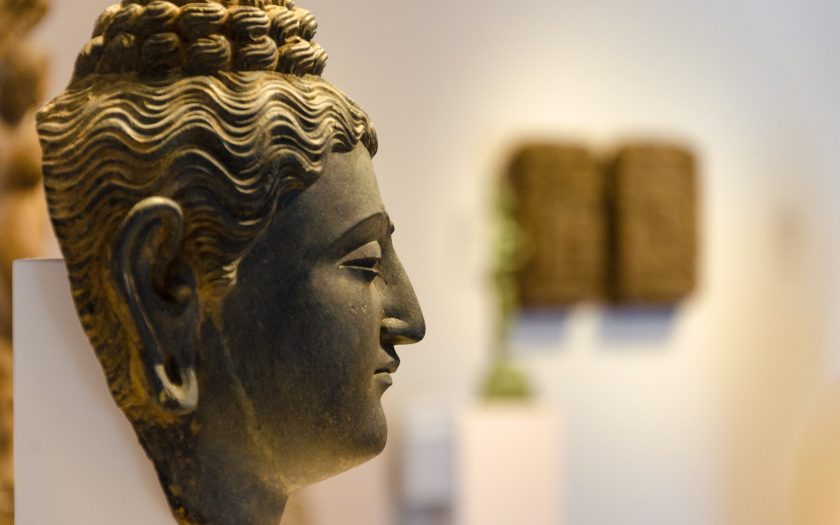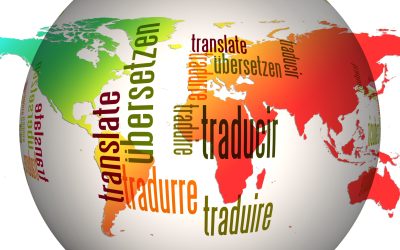De Bijbel is vol aanwijzingen van de Heere God over hoe wij mensen Hem mogen dienen. Dat ‘mogen’ is niet een mogelijkheid uit vele, niet een optie die we ook links kunnen laten liggen. Maar het is ook geen moeten in de zin van plicht of dwang. Wij mensen kunnen keuzen maken en daarom is het bijzonder dat de Bijbel ook voortdurend laat zien hoe we niet tot God mogen naderen. Ook in Deuteronomium 4 staan deze dingen weer in contrast met elkaar en ze zijn ook voor de gelovige christen van 2024 betekenisvol.
- A little background
- Leaving out or adding nothing
- Baal-Peor and the gods
- It is deception: no spirit dwells in it
- Een paar ontmoetingen met 'Dat wat groter is dan onszelf'
- In the 21st century, what do we still have with images?
- We cannot feel the Lord God
- The Lord gives us His words
- The Lord God is near: believe it
- Blessed who seek the Lord
A little background
Deuteronomy is the last book of Moses. You could say it is his last words to the people of Israel; a kind of farewell letter. Moses led the people out of Egypt and preceded them through the desert for forty years. Before they will cross the Jordan River and enter the Promised Land, Moses gives them this book, as it were. it is the book of Moses that warns most against idolatry.
In de eerste hoofdstukken doet Mozes heel kort verslag van de gebeurtenissen van het volk na de uittocht uit Egypte. Hij verhaalt hoe ze geweigerd hebben het beloofde land binnen te gaan (Deuteronomium 1:26). Dat was ‘niet alleen maar’ ongehoorzaamheid of ongeloof maar een gevolg van de afgodische praktijken die ze uit Egypte hebben meegenomen (zie here). If you read the first chapter, it shows that they were afraid of the giants that were in the land and did not trust the Lord.
In het tweede en derde hoofdstuk lees je dat ze na veertig jaar weer optrekken naar het land en dan door de gebieden van de koningen Sihon en Og moeten. Daar woonden – ten oosten van de Jordaan – soortgelijke reuzen als de verspieders 40 jaar eerder in het beloofde land hadden gezien.
Hierna krijgen we de hoofdstukken 4 en 5 en daaruit willen we proberen te leren wat dit het volk van God – toen, maar ook nu – te zeggen heeft. Het is goed om deze gedeelten maar eens een keer (of een paar keer) geheel door te lezen. We willen er hier doorheen lopen en nagaan wat deze gedeelten ons zeggen over ‘God dienen’ en ‘de goden dienen’.
Leaving out or adding nothing
Hoofdstuk 4 begint ermee dat deze woorden voor Gods volk bedoeld zijn “opdat u leeft” en dat ze de zegeningen die God voor hen heeft, zouden kunnen ontvangen. Dan wordt daar in het tweede vers meteen aan toegevoegd dat ze het hele Woord van God nodig hebben en dat ze er “niets aan toe zouden voegen en er ook niets van af doen”. Verderop in Deuteronomium komt dezelfde uitdrukking voor: “Dit alles wat ik u gebied, moet u nauwlettend in acht nemen. U mag er niets aan toevoegen en er ook niets van afdoen.” (Deuteronomium 12:32). Dit hele gedeelte van 4:2 tot en met hoofdstuk 12 zit ingeklemd tussen deze zinsnede en gaat er over hoe God gediend wil worden en dat Hij niet wil dat ze ‘de goden dienen’. Deze twee dingen worden in dit gedeelte steeds weer herhaald.
Het mag wel een extra oproep zijn om te begrijpen wat deze begrippen inhouden. Want dit is wat er gebeurt: wanneer ik geen idee heb wat ‘de goden dienen’ betekent, dan lees ik gauw verder. Maar dan veronachtzaam ik het Woord van God en feitelijk doe ik dan van dat Woord af.
Or in other words, the beautiful things in the Bible are wonderful and the Gospel is fantastic, but there are also very difficult things in the Bible and we are all too quick to skip them.
In de laatste verzen van de Bijbel, aan het eind van het boek Openbaring komt een soortgelijke uitdrukking voor: “Want ik getuig aan ieder die de woorden van de profetie van dit boek hoort: Als iemand iets aan deze dingen toevoegt, zal God hem de plagen toevoegen die in dit boek geschreven zijn. En als iemand afdoet van de woorden van het boek van deze profetie, zal God zijn deel afdoen van het boek des levens, en van de heilige stad, van de dingen die in dit boek geschreven zijn.” (Openbaring 22:18-19).
Baal-Peor and the gods
Direct na de waarschuwing in vers twee volgt de herinnering aan wat ze ‘met eigen ogen gezien hebben’ van wat de Here in Sittim heeft gedaan (Numeri 25:1-9). Daar heeft het volk zich gebogen voor de god Baäl-Peor1 and the result was that the Lord had to judge and twenty-four thousand men were killed. It was the terrible consequence of their idolatry that they perished and a tremendous warning to all the people.
Als 21e-eeuwse westerse christenen kunnen ons weinig voorstellen bij de vroegere godendiensten. Daarom is het goed om te bedenken dat in de heidense religies altijd beelden gebruikt zijn. Men meende dat een beeld de (tijdelijke) woonplaats van een godheid was en dit ‘geloof’ is door de geschiedenis heen in verschillende culturen en religies wijdverspreid tot op de dag van vandaag. Het staat bekend als animism of fetishism and can explain why images (as well as objects) play an important role in all religious traditions.
Click here if you want to learn more about what animism or fetishism is.
Animism
Animism is the belief that objects, places and beings have a spiritual essence or soul have. This idea is often present in traditional religions, especially among indigenous peoples, where natural elements such as trees, mountains, rivers and also man-made objects (such as statues) are considered animated. An image is then seen as a dwelling for the spirit or deity it represents, and by paying homage to that image, you honor the spirit or god itself.
The Fetishism
Fetishism is a related concept in which it is believed that specific objects, such as statues, magical or supernatural forces have. These objects could contain divine powers that offer protection or grant wishes. This idea was (and is) present in several African and Oceanic religions.
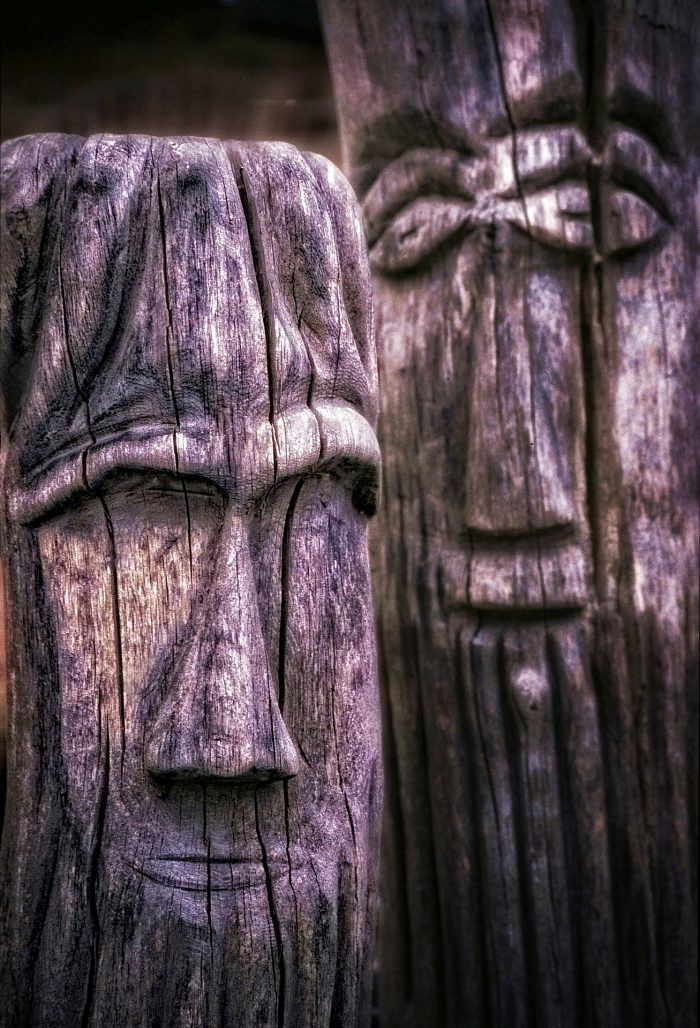

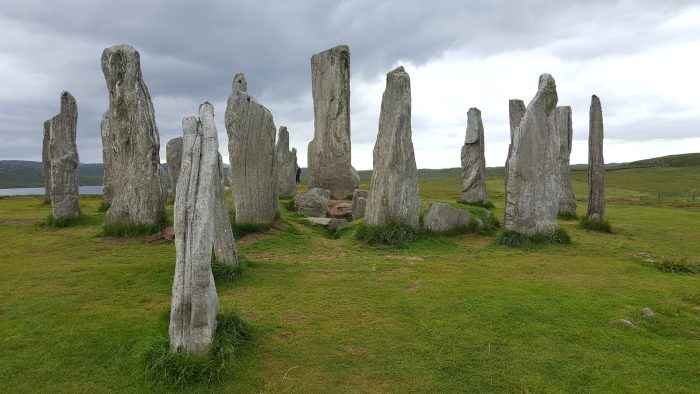
When you wanted or wanted to hear something from the deity for whatever reason, there were rituals to support that so that the god heard you and you got an answer to your question or desire.
But then we Westerners say it is superstition, because there is no god in a statue, so what are you doing anyway? It is pure nonsense and self-deception, isn't it?
It is deception: no spirit dwells in it
That there is no god in an image is a statement confirmed by the Bible, for we find the same thought in Jeremiah 10:14 and 51:17). In the EBV2-translation read the following:
"(...) for his cast image is deceit and no spirit dwells in it."
Jeremiah 10:14 and 51:17
The Bible makes two things clear in this text.
– een beeld is niet bezield, heeft geen adem en is niet de woonplaats van een geest. Een beeld is dode materie (zie bijvoorbeeld Jeremia 10:3-5).
– dat je toch je iets bijzonders ervaart, iets dat zich als god aan je voordoet, is bedrog!
When people bow down before an image and perform rituals or offer sacrifices, they experience the deity. This is actually bizarre because you seek an invisible living being (God or a god), turn to dead matter and then you experience that which you seek: God or the god.
Wanting to experience God is the way
To 'divine experiences' of demons
The gods of the nations are approached that way, and they - the demons - are ready to give people unforgettable experiences. That is why the Lord forbids His people to approach Him in a pagan way. Because in reality you then come into contact with the demons3 And you are deceived by them.
Dat demonen dit misleidende bedrog aan mensen doen is geen wonder, want ze zijn uit hetzelfde hout gesneden als de duivel die ‘de leugenaar en de vader van de leugen’ is (Johannes 8:44). Als de satan, die ook wel de ‘vorst van de duisternis’ wordt genoemd, zich voordoet als een ‘engel van het licht’ (2 Korinthe 11:14), dan is het niet verbazend dat demonen op soortgelijke wijze mensen bedriegen.
Een paar ontmoetingen met ‘Dat wat groter is dan onszelf’
When we consider this then we can also make sense of what happened at Sinai when the people of Israel worshiped the golden calf. It reads like this:
“Toen rukte heel het volk de gouden ringen die ze in hun oren hadden, af en zij brachten ze bij Aäron. Hij nam ze van hen aan, hij bewerkte ze met een graveerstift en maakte er een gegoten kalf van. Toen zeiden zij: Dit zijn uw goden, Israël, die u uit het land Egypte geleid hebben.
When Aaron saw this, he built an altar for it, and Aaron announced: Tomorrow there will be a feast to the LORD! They rose early the next day, brought burnt offerings and also brought thanksgiving offerings. The people then sat down to eat and drink; then they rose to celebrate lavishly.
Then spake the LORD unto Moses, Go, descend: for thy people, whom thou hast led out of the land of Egypt, have acted perniciously. They have quickly departed from the way which I had commanded them: they have made for themselves a cast calf, they bow down before it, sacrifice to it, and say, These are your gods, Israel, who have led you out of the land of Egypt. (Exodus 32:3-8)
Aäron meende dat ze een feest voor de Here zouden vieren, terwijl het volk in werkelijkheid met afgoderij bezig was. Wat ze innerlijk ervaarden en voelden was wat ze noemden ‘uw God’4. Thus they have been horribly misled.
Another special case is the copper serpent, a symbol of God's grace.
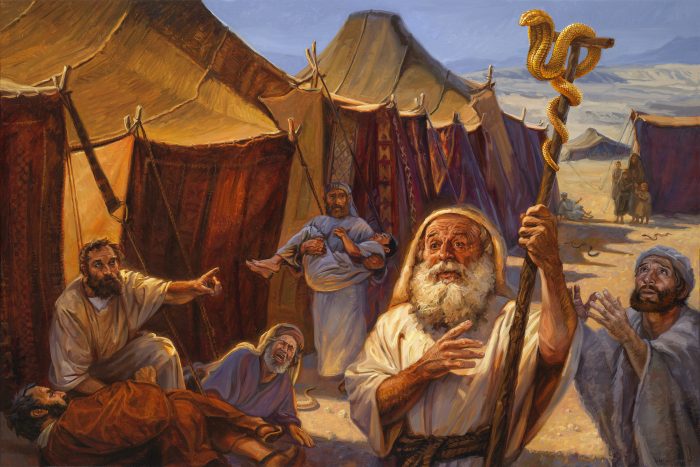
“En de HEERE zei tegen Mozes: Maak u een gifslang en zet hem op een staak. Het zal gebeuren dat ieder die gebeten is, in leven zal blijven, als hij daarnaar kijkt. Toen maakte Mozes een koperen slang en zette hem op de staak. En het gebeurde als de slang iemand beet dat hij naar de koperen slang keek en in leven bleef.” (Numeri 21:8-9)
For the people brought the serpent with them into the promised land, and apparently at some point it began to be used as an image for worship. King Hezekiah, who removed from the land the sacrificial heights where idolatry was committed, also destroyed this copper serpent.
“Hizkia nam de offerhoogten weg, sloeg de gewijde stenen in stukken en hakte de gewijde palen om. Hij verbrijzelde ook de koperen slang, die Mozes gemaakt had, omdat de Israëlieten er tot die tijd toe reukoffers aan gebracht hadden; men noemde hem Nehustan.”(2 Kings 18:4)
De koperen slang die Mozes in opdracht van de Here moest maken en die genezing bracht wanneer men er naar keek, werd notabene tot een voorwerp van aanbidding. Het werd zogezegd ‘een beeld waar een geest in zat’. Zie verder ook nog here.
In the 21st century, what do we still have with images?
Just a quick note in between.
Wij zouden kunnen denken dat wij, christenmensen van de 21e eeuw, niks hebben met beelden. Toch klopt dat niet, want om te beginnen heeft een groot deel van de christenheid wel wat – of misschien wel veel – met beelden. Denk maar aan de rooms-katholieke kerk of oosterse kerken, waar je geen kerkgebouw kunt binnenkomen zonder beelden tegen te komen. Beelden van Christus, de crucifix, maar ook de beelden van allerlei heiligen. In de rooms-katholieke catechismus5 the second commandment is omitted and the tenth is split in two, so you still get ten commandments again.
Maar bovendien moeten we dit voor onze tijd veralgemeniseren. Het principe is dat Gods volk – Israel destijds, maar ook de christen nu – niet tot God mag naderen op de manieren waarop de ongelovigen tot hun goden naderen (zie here). Er zijn in de loop van de tijd veel meer manieren ontstaan, waarmee mensen zich tot de onzichtbare wereld wenden. Denk als voorbeeld maar aan ‘de stilte’, meditatie in allerlei vormen, Lectio Divina, ‘profeteren’, het ‘Jezus-gebed bidden’, een rozenkans, een labyrint lopen, enzovoorts. De lijst is oneindig.
The bottom line is that we may approach the Lord God in faith only in the Bible, His Word. Anything that goes beyond that and is intended to make us experience something special from God, we must strongly reject. Also read here about the crafty temptations.
“Want wie tot God komt, moet geloven dat Hij is, en dat Hij beloont wie Hem zoeken.”
Hebrews 11:6
Laten we ons niet misleiden dat er ‘meer’ zou zijn!
We cannot feel the Lord God
Maar onze God is anders en hoger dan alle goden. Hij is de schepper van hemel en aarde, de allerhoogste God en Hij kan niet benaderd worden zoals de goden. Hij verbindt zich op geheel andere wijze met Zijn volk. Wanneer Hij met Zijn volk communiceert doet Hij dat met woorden die te begrijpen zijn. Zo staat het ook in het hoofdstuk – Deuteronomium 4 – waarmee we begonnen zijn:
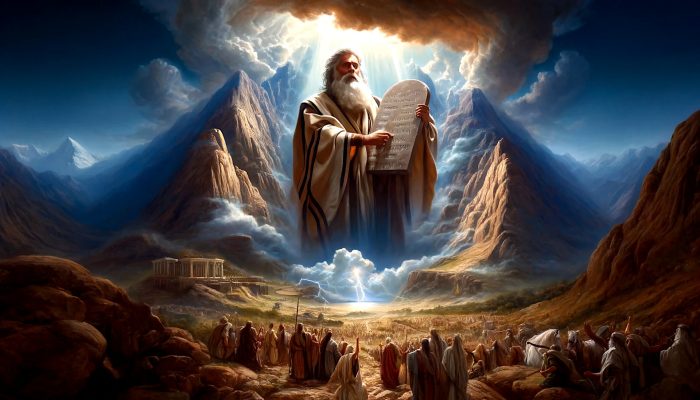
"You may neither add to nor subtract from the word which I command you, that you may observe the commandments of the LORD your God which I command you. (...) Behold, I have given you the regulations and provisions learned, as the LORD my God commanded me; to act thus in the midst of the land into which you shall come to take possession. (...) On the day that you stood before the LORD your God at Horeb, the LORD said to me, Call the people together before Me, and I will make them hear My words, which they are to learn, to fear Me, all the days that they shall live on the face of the earth, and which they are also to teach their children. (...) And the LORD spoke to you from the midst of the fire; the sound of the words you heard, but a figure you did not see, there was only a voice. 13 He made known to you His covenant, which He commanded you to do, the Ten Words, and He wrote them on two stone tablets. 14 And I commanded the LORD in those days to teach you ordinances and provisions, to do them in the land to which you go to take possession of it. 15 You must, for the sake of your life, be very wary - for you did not see any figure on the day that the LORD spoke to you at Horeb from the midst of the fire ..." (Deuteronomy 4:2,5,10,12-15)
Actually, you should read through the whole chapter. It was a terrifying situation there at Mount Horeb. A mountain that burned with fire, to the very heart of heaven, darkness, clouds and darkness. Although the sound that could be heard in the process had to do with the words God spoke, they did not see His stature. They perceived something terrible from the Lord without understanding it. To put it this way, what they could perceive of the Lord is not exactly something that would make you feel good. Nor does it invite you to try again ...
The message the Lord was giving with that was that you as a human being should not try to get closer to Him. Then you would suffer the terrible consequences.
Yet at the mountain, the Lord also made it known how He wants to be served.
The Lord gives us His words
He gave His words: the 10 words He Himself wrote on the clay tablets and the ordinances and provisions He gave to Moses. In Exodus, it is written from the tablets:
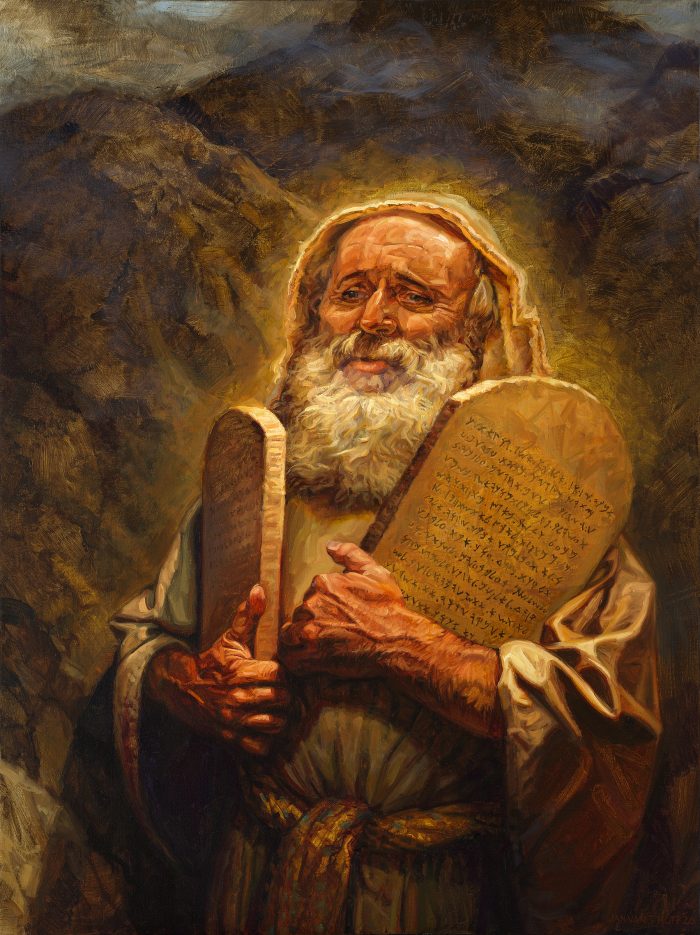
And when the LORD had finished speaking to him on Mount Sinai, He gave Moses the two tablets of the testimony, tablets of stone,
described with the finger of God.
(…)
Those tables were God's own work;
Also, the writing was God's own writing,
in de tafelen gegraveerd.”
(Exodus 31:18; 32:16)
It is impressive how it is described here: the finger of God, God's work and God's own writing. Could He say it more clearly that every word He has written comes from Him? That they are His thoughts and His own words? And would that only apply to the Ten Commandments?
I am convinced that it applies to the entire Bible, that is, including everything Moses, the prophets and the apostles wrote. It is unmistakably God's own Word, His own work6.
Trouwens de uitdrukking ‘finger of God‘ komt vier keer in de Bijbel voor. Twee keer staat het in contrast met het werk en de onmacht van demonen (Exodus 8:19; Lukas 11:20). De andere twee keren betreft het schrijven op de stenen tafelen (in Exodus 31:18 en Deuteronomium 9:10) en dat duidt erop dat de Bijbel ons wil meedelen dat de Bijbel werkelijk door God geschreven is en niet het werk van demonen kan zijn.
Satan and his powers are unable to give a book like the Bible to people. It is written by the finger of God, His own work!
Therefore, they were words they could understand. That was the way the Lord made Himself known to His people: through His words they could get to know Him and understand what He liked.
Of course, this is completely different from how the gods connect with humans: by giving them wonderful experiences too great for words.
God, the Creator of all things, communicates with His people in words they can understand. But there is something very special about this.
The Lord God is near: believe it
God not only gave His words, but He also promised them that He would be close to them. We read that in the same chapter Deuteronomy 4, and it is worth reading that chapter again carefully.
"For what great nation is there where the gods are so near as the LORD our God is with us, always when we cry to him?"
Deuteronomy 4:7
The Lord gave two things: His words and His nearness; but with them the warning not to serve the gods of the nations. If you believed the Word of the Lord, you did not have to go to an image and perform some ritual, then wait for the deity to come to you. No, if you believed Who the Lord was and trusted what He had said, then you were allowed to go directly to Him and call upon Him. He was right there with you!
We easily say it that our God is omnipresent. But that is still fairly general and impersonal, although it is actually incomprehensible to us. But when God says to His people that He is near, it does take on something very personal and secure.
Dat de Here dichtbij is, is iets dat we weten omdat Hij het gezegd heeft. Het is niet iets dat we zouden kunnen voelen. Het is Gods belofte die we vertrouwen en daarom weten we dat Hij dichtbij is. We hebben daar geen beeld en rituelen of een of ander ‘heilig voorwerp’ voor nodig7.
Later schrijft Paulus aan de Romeinen: “Close to you is the Word, in your mouth and in your heart.” (Romeinen 10:8). In dat gedeelte citeert hij Mozes en schrijft dan verder als volgt:
“Dit is het Woord van het geloof, dat wij prediken: Als u met uw mond de Heere Jezus belijdt en met uw hart gelooft dat God Hem uit de doden heeft opgewekt, zult u zalig worden. Want met het hart gelooft men tot gerechtigheid en met de mond belijdt men tot zaligheid. Want de Schrift zegt: Ieder die in Hem gelooft, zal niet beschaamd worden. Er is immers geen enkel onderscheid tussen Jood en Griek. Want Een en dezelfde is Heere van allen en Hij is rijk voor allen die Hem aanroepen. Want ieder die de Naam van de Heere zal aanroepen, zal zalig worden.” (Romeinen 10:8-13)
To believe that our God is near, that His Word is near, and in that faith to seek communion with the Lord God and His Word is a task for every believer. A task we do not do because we have to, but because we love Him (e.g. Deuteronomy 10:12 and 1 John 4:19).
Blessed who seek the Lord
Een prachtig voorbeeld geeft ons de dichter van Psalm 119. Het is de moeite waard die Psalm nog maar weer eens in zijn geheel te lezen. Het is bijzonder hoe de anonieme psalmdichter getuigt van een leven met de Here en Zijn Woord. Die twee dingen zijn voortdurend verweven met elkaar – je zou ook kunnen zeggen: ze vallen samen – en horen onlosmakelijk bij elkaar.
Below is a small and random selection
“Welzalig wie Zijn getuigenissen in acht nemen,
who seek Him with all their heart,"
(…)
“Ik zoek U met heel mijn hart,
Let me not stray from Your commandments.
I have stored Your promise in my heart,
That I may not sin against You.
Praised be Thee, LORD,
teach me Thy ordinances."
(…)
“Ontsluit mijn ogen en laat mij aanschouwen
The wonders of Your law.
I am a stranger on the earth,
Do not hide Your commandments from me.
My soul is consumed with desire
according to Your provisions, at all times."
Psalm 119:2, 10-12,18-20 –
Footnotes
- Baal-Peor betekent ‘Heer van Peor’. Peor betekent zoiets als ‘kloof’. Mogelijk verwijst dit naar de godheid, die je niet zomaar kunt bereiken; een scheiding makende kloof moet je wel kunnen overbruggen. Beelden en rituelen zijn nodig. ↩︎
- Het Hebreeuwse woord is ‘ruach’ dat meer dan 300 keer in het Oude Testament voorkomt en ook vaak als ‘geest’ of ‘Geest’ wordt vertaald. De HSV vertaling heeft hier he woord ‘adem’. ↩︎
- The (off)divination is always associated with dealing with demons. In the following places the gods are literally called demons: Leviticus 17:7, Deuteronomy 32:17; 2 Chronicles 11:15; Psalm 106:37. ↩︎
- Of ‘uw goden’. ↩︎
- The RC Catechism is a simplified doctrine of faith, so that ordinary people could understand the Bible to some extent. ↩︎
- Zie ook 2 Timotheüs 3:16 – “Heel de Schrift is door God ingegeven en is nuttig om daarmee te onderwijzen (…)” ↩︎
- In this connection the following. It is quite conceivable that this is also the reason why only Aaron and his sons were allowed to do the work on and in the tabernacle. Other Israelites were not even allowed to come close to the tabernacle and its objects so that they would not be tempted to approach the Lord in a pagan manner. If anyone came too close, such a person was to be put to death (e.g. Numbers 1:51; 3:10,38). When Uzza touched the ark of the covenant that threatened to fall, he had to pay for it with death (2 Samuel 6:7). ↩︎
